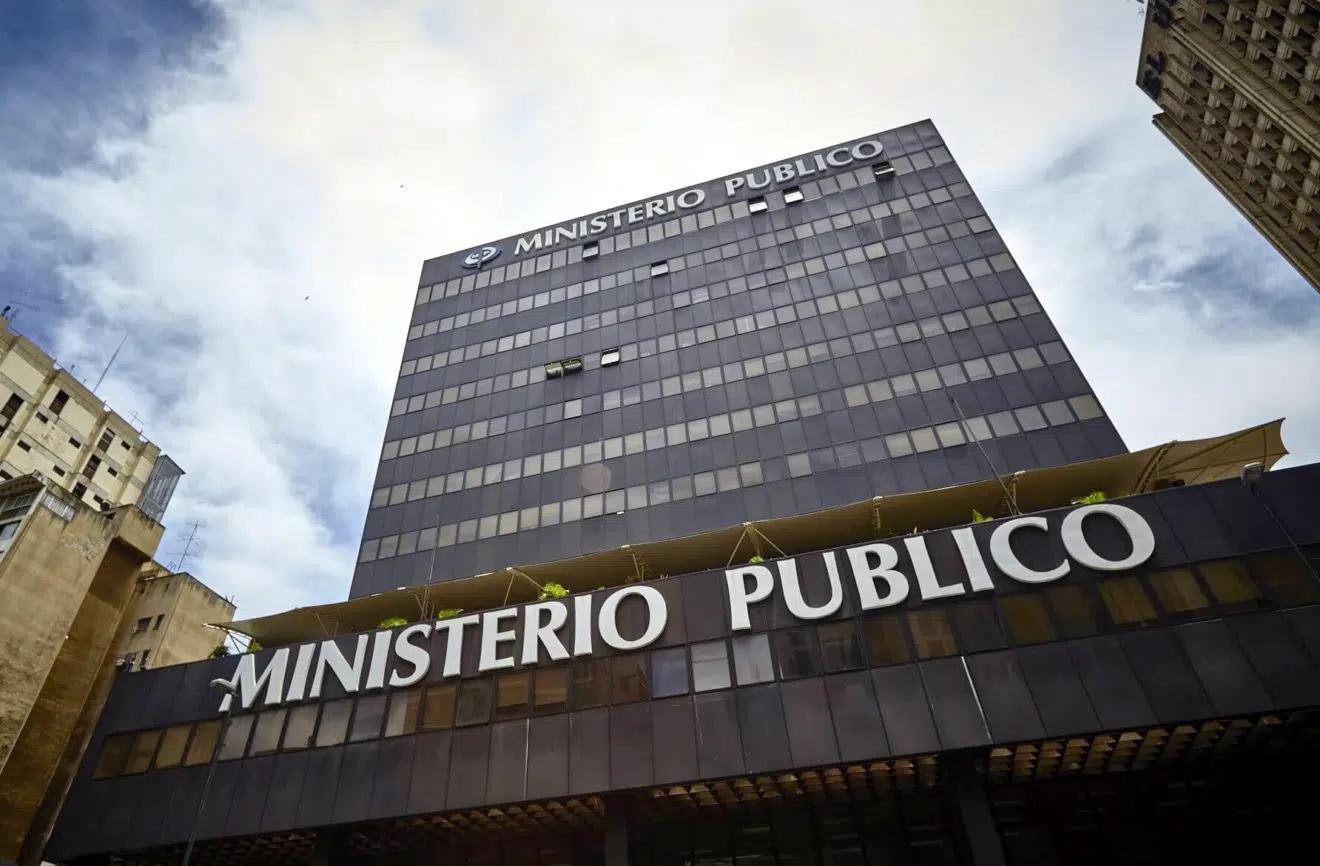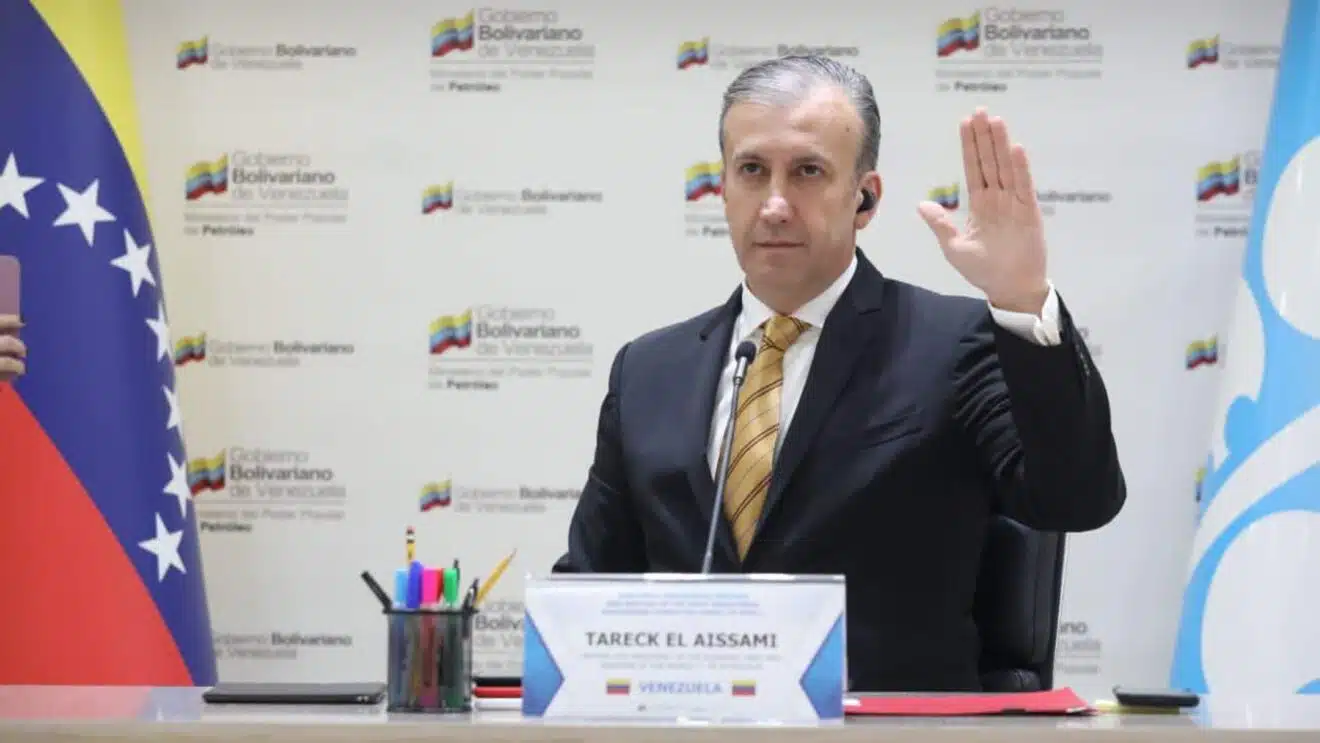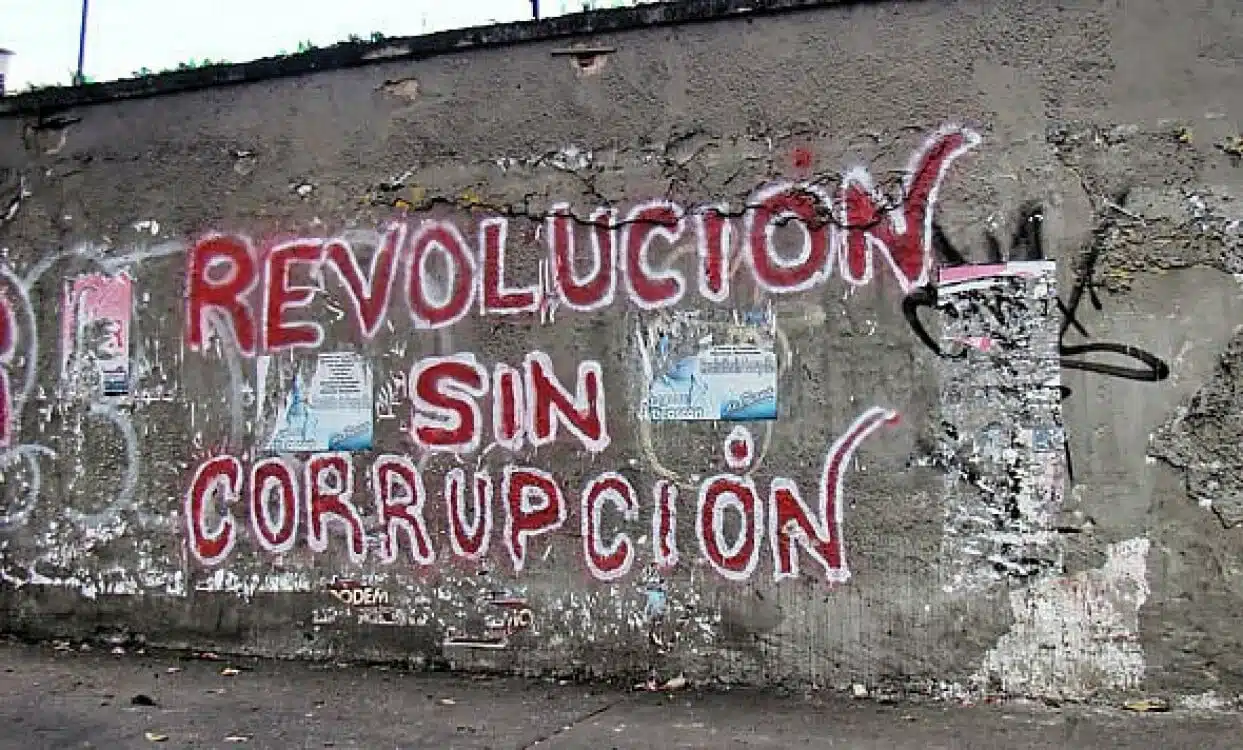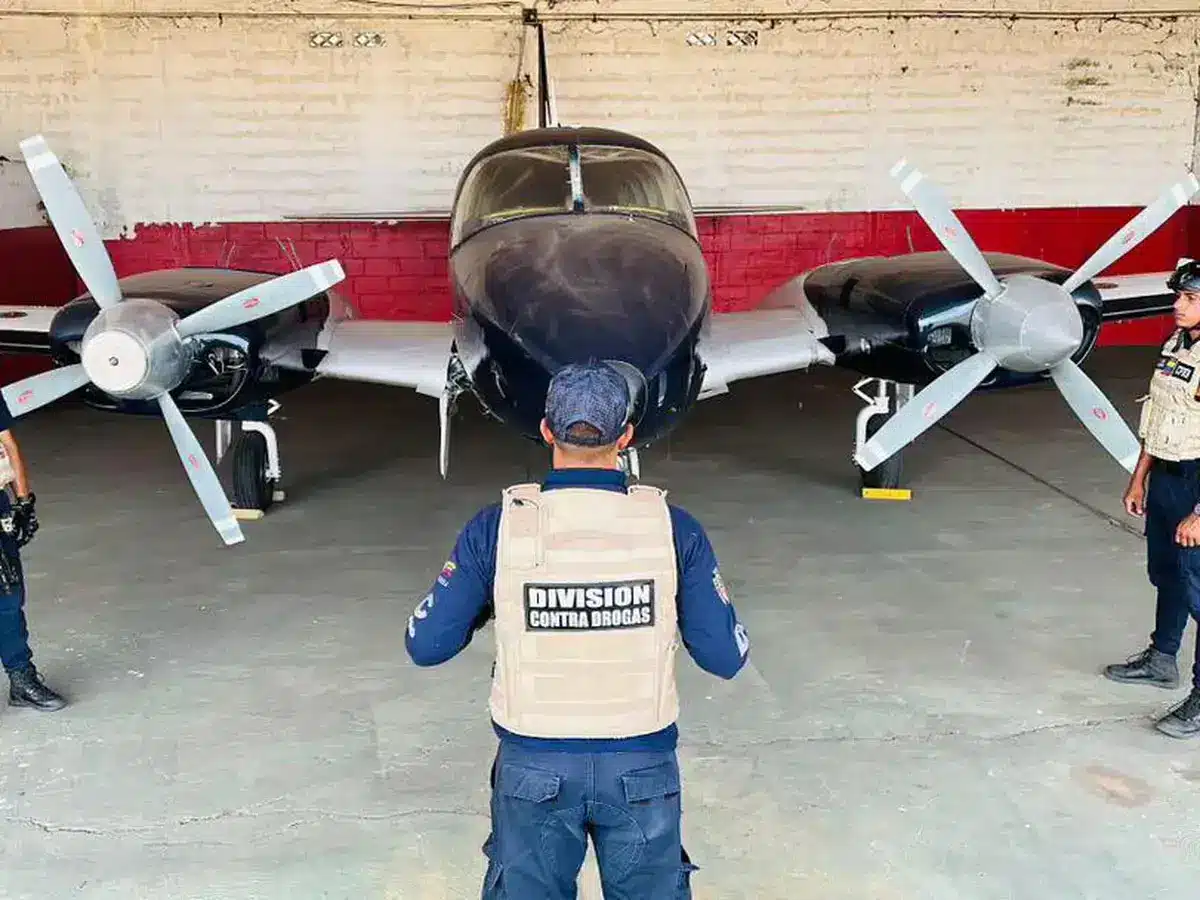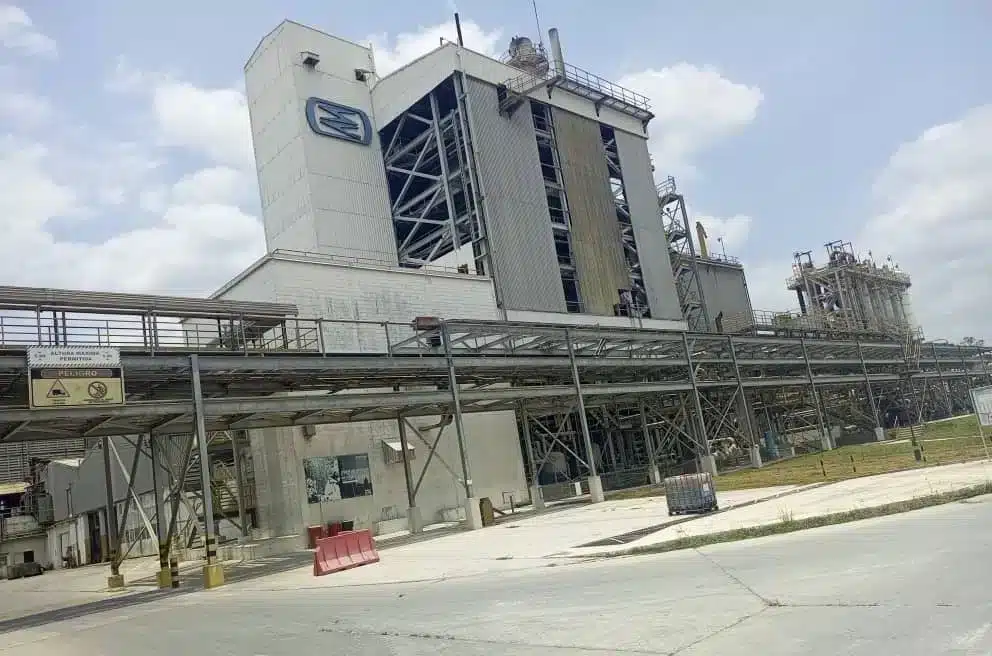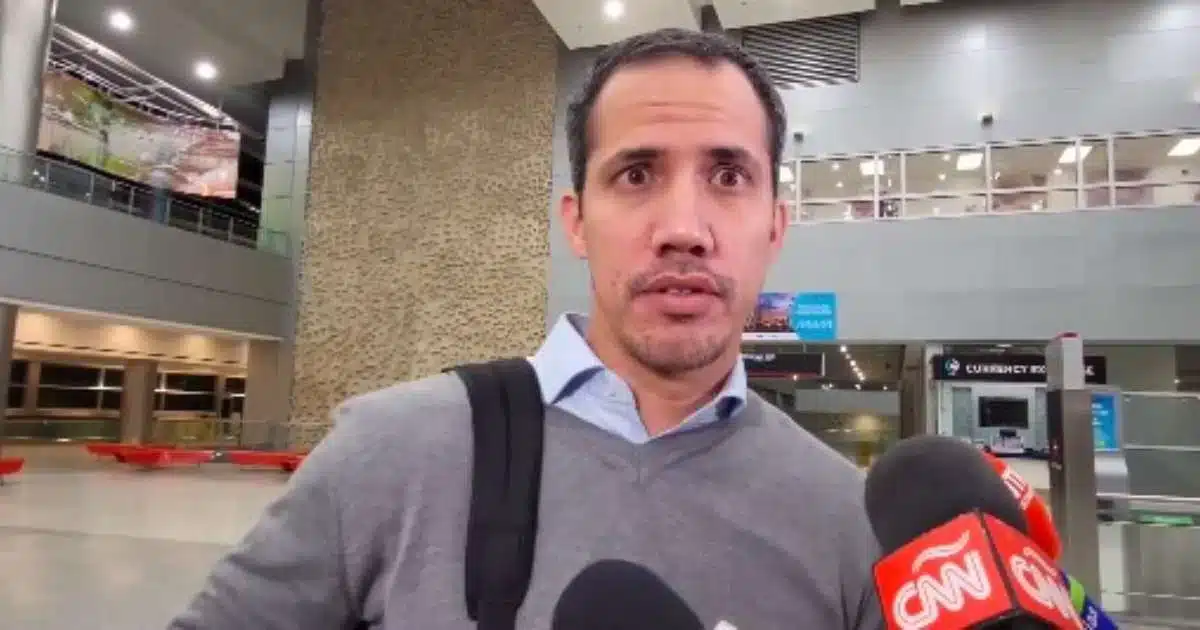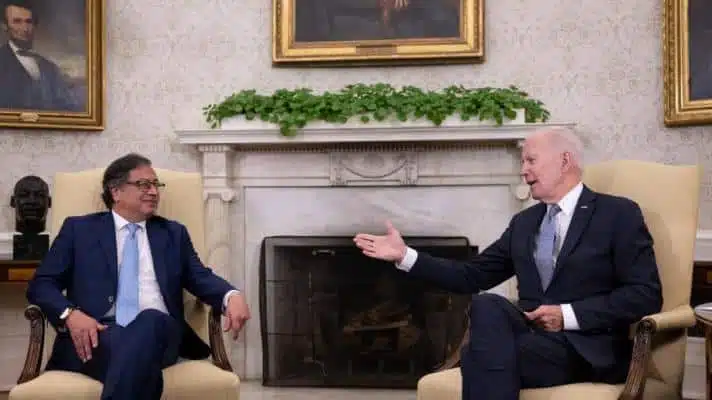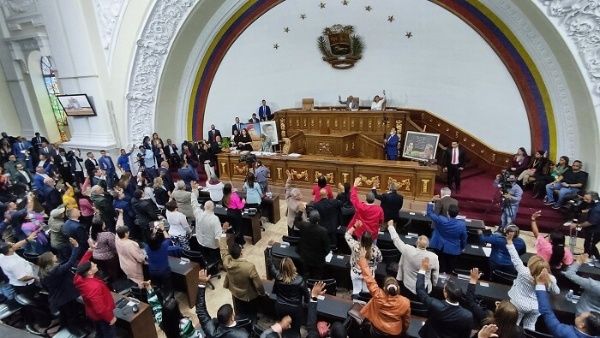Venezuela Rejects Washington's Unfounded Accusations

People walk past a mural with the Venezuelan flag. | Photo: Twitter/ @AndyVermaut
Published 24 May 2023
By using an issue as sensitive as terrorism to launch unfounded accusations of a political nature, the U.S. demonstrates its indolence before the millions of victims of this scourge.
On Tuesday, the administration of President Nicolas Maduro issued an official communiqué rejecting the United States questioning Venezuela's commitment to the fight against terrorism.
"The Government of the Boliviarian Republic of Venezuela once again rejects the questioning of Venezuela's commitment to the fight against terrorism, which year after year has been demonstrated by complying with all its nacional and multilateral obligations in this sensitive matter," the official communiqué reads.
This declaration came after the U.S. State Department certified before Congress that Cuba, Iran, the Democratic People's Republic of Korea, Syria, and Venezuela were not "cooperating fully with U.S. antiterrorism efforts."
Underscoring U.S. cynicism, the Venezuelan statement said, "there are plenty of examples of terrorist practices against our region that have been protected and encouraged from Washington."
For example, the Bolivarian government recalled that the use of unilateral coercive measures as a foreign policy constitutes, in itself, a true form of terrorism.
"By using an issue as sensitive as terrorism to launch unfounded accusations of a political nature, the United States demonstrates its indolence before the millions of victims of this scourge," the official communiqué reads.
Venezuela also blamed the United States for the fact that one-third of the planet suffers from "economic, political and financial terrorism," which impedes development and world stability. Caracas again urged Washington to respect international law.
https://www.telesurenglish.net/news/Ven ... -0007.html
********
SPECIAL REPORT: WHO DECIDES US POLICY ON VENEZUELA?
May 22, 2023 , 4:03 p.m.

The Military-Industrial-Congressional-Intelligence-Media-Academia-Think Tank Complex shapes, designs and makes decisions in the United States (Photo: File)
The review of the activity of three high-profile, circulation and influential US think tanks within the spheres of power of the US government and the corporate universe, in their work and approach to Venezuela, reveals that a line of investigation is "producing " , discussion and analysis about Colombia and its relationship with Caracas.
Where could this relationship be directed? Think tanks keep that question in mind at all times. The matter is subject, of course, to the direction it takes and the actions carried out by the current government of Gustavo Petro in Colombia.
THE PLACE OF THINK TANKS
Despite the cacophonous, wordy, and even humorous nature of the acronym, former CIA analyst and one of the founders of the group Veteran Intelligence Professionals for Sanity, Ray McGovern, refers to the power structure that effectively shapes, designs, and makes decisions. decisions in the United States such as MICIMATT , an abbreviation in English for the Spanish "Military-Industrial-Congressional-Intelligence-Media-Academy- Think Tank" complex .
The abbreviation essentially defines what makes up the so-called "Deep State": the non-elected power structures that do not depend on the electoral cycles to govern, exercise weight, presence, definition and operation within the US State.
Thus, from this synergy, the place of the different think tanks in the process of creating policies, later implemented by some instance of formal power —either the executive or the legislative branch— is clearly located, and how, also, their actors and promoters circulate through the rest of the links that establish the circuit of the letters that make up the McGovern acronym.
There are many competencies or areas of study and policy design that characterize them, for example one with a tradition in defense matters and with strong ties to the Pentagon: Rand Corporation , from where some recommendations and procedures can be detected that are later used in theaters of operations or the analytic approach that would be established by the Army Joint Chiefs or the White House bureaucracy. In essence, it has the same financing schemes and relationship system as any of the high-level ones, but it is limited to that area of expertise.
Apart from the Rand, those with the greatest prestige, tradition, and even longevity focus mainly on foreign policy and its different conceptual fields such as trade, energy, human rights, migration, and bilateral relations —between individual countries and the United States— or on multilateral action in the different political or commercial forums.
Perhaps the oldest organizations in the United States in this regard are the Council on Foreign Relations (CFR), founded in 1921, and the Brookings Institution, founded in 1916.
But there is a "breed" that emerged after the post-war order in the middle of the last century—another way of putting it would be in the Cold War framework—that of itself has structured a tradition and a pattern of influence, which to some extent , like the CFR, is assumed to be non-partisan ( non partisan ) but which, in its own ideological reflection, also like the CFR to a great extent, expresses the liberal vision that permeates today the generalized world perspective within the labyrinthine corridors of MICIMATT in Washington.
The most descriptive examples of the latter might be the Center for Strategic and International Studies (CSIS), the Atlantic Council , and the Woodrow Wilson International Center for Scholars . Woodrow Wilson International for Scholars —better known as the Wilson Center.
Further to the right are also representative formations such as the American Enterprise Institute (AEI) or the Hudson Institute, generally explicitly at the service of the Republican Party, to name, along with those above, those that perhaps represent the main cluster and more conspicuous.
Regarding Venezuela, the three mentioned in the penultimate paragraph have been occupying a significant place in recent years. That under a Democratic administration, as now, those prevail over the others puts in between the lines, precisely, the presumed " non partisan" character .
VENEZUELA POLICY MAKING
CSIS, the Wilson Center and the Atlantic Council have in various ways targeted Venezuela especially in recent years. It is worth saying that they hold two regional study programs —it is a common brand— from all over the globe, generally one of their fellows , guests or plant specialists address some element of temporary interest, in electoral or resource matters in which they gloss the specific issue without much immediate consequence, at least in appearance.
However, from the beginning of the "Guaidó cycle" to the present day, with emphasis during the "interim", several indicators seem to point to a special role or interest of these formations in the case of Venezuela.
This could obey several patterns, but one of them is to arrange, under the same mechanism of MICIMATT, and supply lines of action to the approach that the current executive branch has had, erratic in its own right, on Venezuela. In turn, an explanation could be offered by the implicit logic that Guaidó represented, firstly within the "maximum pressure" campaign that characterized the last years of the Trump administration and, secondly, the extreme dissonance that the government itself represents . "Guaidó project" in the harmonization of the "order based on rules", the totemic mantra not only of the current administration but of the world vision of the liberal order itself, or of how the imperial donkey is herded in the current context.
Another element, not only with respect to Venezuela but also to the region, could be the regional political correlation, very different from the restoration consensus that prevailed from 2015 to 2020, that is, more or less since Macri's electoral victory in Argentina at the end of the year. —together with the electoral debacle in Venezuela in the legislatures— until, perhaps, the return to democracy in Bolivia.
Today this point is accentuated after last year important regional subjects such as Colombia and Brazil, words more words less, also changed their political sign —a development on this is presented later. Gone is the operational consensus that it meant with respect to Venezuela, and to a certain extent and by extension to Cuba and Nicaragua, which brought together the Lima Group as a "multilateral" instance capable of granting that coverage to the regionalization of regime change actions. against Caracas.
On the energy level of the United States, but not of Venezuela, the event with the greatest global incidence so far in 2022 and 2023 with its respective reverberations exerts a specific weight —which urges a new look—: the war in Ukraine and the injection of steroids into the "sanctions" regime against the Russian Federation which, in turn, has put transatlantic energy dependence itself in check.
A cursory review of the production of these three think tanks establishes some consensual minimum points that, at the same time, are expressed by the White House itself, namely: the recognition of the failure of disruptive ways to effect regime change, the recognition of the principle of the electoral route as a mechanism to implement this "change" and "transition", the specific focus on migration and "humanitarian crisis" —along with the speculative ways to stir them up —, the different roles of the subjects of "civil society "as reinforcement of the rickety parties and, finally, at least to open the compass of the discussion on the function and effectiveness of unilateral coercive measures.
Inevitably, this leads to the attempt to redirect itself based on really existing situations, such as the dialogues in Mexico, one of the fundamental points to establish, despite the differences between the different groups and "specialists", the government-opposition dialogue.
Other elements come together: what these three think tanks understand by opposition —fundamentally the G4, particularly the most devalued by the failures of "maximum pressure"—, the non-modification of the representation of the Venezuelan government and President Nicolás Maduro as a dictatorship , and highlight maladministration, authoritarianism and corruption as causes of the crisis, leaving, depending on the case, in a second or very second level the responsibility of the "sanctions" in the economic, financial and commercial deterioration of the Republic Bolivarian.
This is the framework within which the three institutions studied for this report operate.
IMPACT, INCIDENCE, QUESTIONS
Supporting the premise of the erratic nature of the Biden administration's foreign policy approach to Venezuela, and adopting the energy urgency resulting from the war as a defining point, in some cases the recommendations explicitly focus on what to do regarding oil and gas. Venezuela and the attempts to reintegrate into the market; in others, without recognizing it, the need for the so-called "paradigm change" is strengthened.
An example of the latter is the way in which a counterpoint was established between the outline of recommendations and the analysis of the situation that the Wilson Center presented in December and the "road map" that it established "seeking a different course" in which it is established with accurately the framework described in the previous section . However, despite the change in language and signifiers, it is clear from the way the side of the government and Chavismo are understood that the "paradigm shift" is nothing more than a resource of optics and decoration.
But the cluster of keywords and conceptual field that was established there seemed, at least until the end of March, to be reproduced in the indirect approach mode that was structured around the "conflict agenda" of the moment , when trade union instances prevailed over the traditional partisans, since it seemed to suggest that either through the primaries or through that very thing, it would be possible to recover a certain degree of entity and incidence, and the possibility of the appearance of the so-called outsider was also opened if the recomposition of the parties failed . parties of preference for the United States, be they Democrats or Republicans.
However, strictly on the political level, the apparent harmonization between the Wilson product and what had been happening in Venezuelan national politics and its relationship with the United States seems to have suffered a deviation, which rather raised a shift, both in attention as in the way of acting. Regarding the first, the anti-corruption day within the government simply erased from the panorama any other record of the moment, raising the question of how far, in reality, the protest movements around wages enjoyed, let's say, organic energy to exist.
Then, in the field of international relations, a new approach that moved away from the suspense of the elements around the ongoing dialogue and negotiation, the political imprint of 2022, based on the indirect results of the conference on Venezuela that had an appointment in Colombia in April.
If the Wilson Center played a "lead" role in the "thintankland" sphere in the first quarter, much of the public discussion, conclusions and recommendations began to pass later mainly through the Atlantic Council itself.
It gives the impression that the main way to increase the profile and attention is mainly due to the change of government in Colombia and the breakdown of stability in terms of absolute obedience that has marked relations between Washington and Bogotá .
The arrival of Gustavo Petro at the Nariño Palace in itself arouses attention and no less concern despite the fact that, in general terms, it is not an alarming radicalism, although it is within the Colombian political context.
The main controversy or point of anxiety for the United States, by all accounts, is the relationship with Venezuela , and within that the process of normalization and —capital sin— of cooperation and collaboration between Caracas and Bogotá.
This could explain the signing of Geoffrey Ramsey as a Senior Fellow in their ranks on March 6. Emerging "Specialist" , one of its fundamental merits is "controlling" a subject of study with an above-average level of interest, involvement and perseverance, something that has little to do with myth and is more niche in a world of experts: no more than the bureaucratic effort of being one of the three people with communication skills who has studied Venezuela in the MICIMATT "market".
Previously playing for WOLA , in the second division, and riding the wave of think tanker surfing , he established himself as a reference among the few scholars on Colombia and Venezuela in the Anglosphere. That not the only one, but one that has had a camera, is from a new breed and has continuously promoted a moderate, pragmatic position, pro-negotiations, in favor of the United States approaching Venezuela from a "non-ideological" perspective.
Here there is no stitch without a thimble. The Atlantic is officially the center of thought for NATO, Colombia one of the "global partners" of the alliance, and Bogota the main route of penetration to influence Venezuelan politics without the strict regulations of the formal; or so it had been until Petro's arrival and his, now, his cabinet "in battle."
Due to all of the aforementioned, the less complicated intuitive explanation of these movements can also be related to the operational advantages that the Atlantic Council itself has in terms of content production format —more synthesized, brief and continuous audiovisual conferences and discussions— with a scope and higher projection than the Wilson Center itself.
Petro's visit to the United States on April 20, and the actions of his cabinet in the following days, particularly his foreign minister Álvaro Leyva Durán, coincide with the suggested increase in the pace of the "production of ideas" and discussions about Venezuela but, above all, about the role of Colombia regarding Caracas as an important conduit of Washington's own policies.
It is within the framework of that visit that the Atlantic created the Colombia-United States Advisory Group. Clearly, the vacuum that exists regarding Venezuela in terms of a policy established by the foreign relations instances of the US government was already extensive to Colombia since the time of Iván Duque himself where, as with Venezuela, inertia seemed to prevail in the face of another Political actor in the region who became deeply involved with the excesses of the Trump administration. The erratic also affects what happens in the New Granada area. And with Petro, at least in principle, the uncertain.
That the CSIS also handle a similar, pragmatic, pro-negotiation, "non-ideological" approach in search of solutions, also operating on the implicit admission of failure in the "maximum pressure" model, especially in the last two years in a constant manner, Rather than describing a competitive scheme, it alludes to the relatively general consensus in foreign policy on the presumed need to "renovate" .
In previous years, the CSIS assumed a notably belligerent position, in tune with the spirit of the times that preceded the current one, when military options against Caracas were analyzed and discussed even behind closed doors.
And at this point it is feasible to say that the confluence in the approach of these three high-level thought groups does not exactly refer to a matter of competition but to an inevitable consensus with a geopolitical background that mainly touches on existential points in the United States.
This, in addition, is accompanied by a structural reflection within the organizational logic and participation of both the Atlantic Council, the CSIS and the Wilson Center: The study programs and advisory bodies. Both CSIS and the Atlantic Council, within their respective regional programs, have different groups exclusively dedicated to Venezuela and, in the case of the Atlantic, now Colombia. The CSIS, within the Americas Program , has the "Initiative for the Future of Venezuela" , while the Atlantic Council, under the umbrella of the Adrienne Arsh Latin American Center , has the Working Group for Venezuela and the scholarship program of study Venezuela Transatlantic Fellowship, which has so far awarded two editions.
At this point, an essential key to the universe of think tanks and the essentially inbred circuit of MICIMATT can be gleaned . In the three formations a series of academics meets —mostly gray—, American political operators of the decision-making bodies of power and, in particular, politicians who became academics or owners of NGOs, who can even be found in two think tanks at the same time.
Take for example José Ignacio Hernández, the "prosecutor" of the "interim Guaidó": he is a fellow of the Growth Lab and the Center for International Development at Harvard but, at the same time , affiliated with both the Atlantic Council's Working Group for Venezuela and the CSIS Initiative for the Future of Venezuela.
On the other hand, the Venezuela Transatlantic Fellowship brings together cabinet members or staffers from the US Congress and Senate and the European Parliament. At the core of this project is "transatlantic cooperation" to "promote a deeper understanding of the complex Venezuelan crisis" as well as "identify action-oriented policies that can address the most salient issues surrounding the crisis."
The CSIS Initiative schedule lists the goals of your work , including:
*A road map for the negotiations in Venezuela.
*Violence and insecurity in the face of the growing presence of non-state actors.
*Increasing geopolitical challenges advocated by external actors who maintain the Nicolás Maduro regime.
*Address ecological degradation caused by gas flaring and illegal mining.
*The role of the oil sector in the economic degradation of Venezuela and its reconstruction.
*Improve the effectiveness of humanitarian assistance to Venezuelan migrants in neighboring countries and address the humanitarian crisis that is unfolding in Venezuela.
*Promote the political involvement of youth and women within a democratic transition.
*The effects and future of international "sanctions" on Venezuela.
"The Venezuela Working Group (VWG) is one that informs politicians in the United States, Europe and Latin America on how to move forward with a long-term vision and action-oriented policies to foster democratic stability in Venezuela. The VWG is part of the ongoing programming of the Adrienne Arsht Latin American Center, which promotes the restoration of democratic institutions through a sustained, human-centered campaign that points toward a democratic resolution to the political crisis led by Venezuela itself," he states . the purpose of the VWG.
The foregoing is completed by the fact that its members come from "diverse contexts, global networks and a deep domain to face the most challenging issues regarding a policy on Venezuela, at both domestic and international levels."
These, too, are the central topics of the main reports and debates that in the last two years, but with particular emphasis on 2022 and 2023, the Wilson Center itself has produced with a different stylistic temperament.
The lexical confluences, of intentions and purposes are clearly not accidental and, moreover, they share the same semantic field of other instances of the system, such as the NED, the USAID and the spokespersons of the State Department and the White House. It's not coincidence.
THE NICHE AND THE INCUBATOR
Up to this point, the lines of "thought" and political molding that would later be raised to decision-making levels can be established, especially in these times when, it is insisted, the United States, at least with respect to Venezuela, has not been able to establish a policy of continuity since 2021 until mid-2023, with a new change of tone and sign that to a certain extent goes against what the different products have raised to a greater or lesser extent, with the exception of the use of pressure through "sanctions" contemplated by practically all .
Apart from that, when making a collection of the majority of the names of the different fellows and recent Venezuelan guests, another logic can be derived, even another mechanics from the function and place of this link of MICIMATT.
The VWG of the Atlantic, in addition to having notable names such as Douglas Farrah —author of the thesis of the Bolivarian government as a criminal enterprise— or representatives of the world of academia and financial circuits such as Francisco Monaldi, there are names that offer another "timbre" to the composition of these groups.
Ricardo Patiño, Leopoldo Martínez and Adriana D'Elia (First Justice); David Smolansky, Miguel Pizarro, José Ignacio Hernández (Voluntad Popular) and "officials" from Guaidó's parallel government are some of the names that "decorate" this group, given that at least Smolansky and Pizarro are not exactly luminaries or academic voices. consistent to talk about nothing but, nonetheless, waiting for better political opportunities incubate within the system.
In a similar way, the CSIS "initiative" has to its credit figures such as Gerver Torres, but also Alexandra Winkler and Moisés Rendón , both well integrated into the circulatory system of "thinktanklandia." The first is Smolansky's deputy in El Hatillo —she is also the co-author of most of the papers along with Ryan Beck, who chairs the initiative and the program itself—, while Rendón belongs to the orbit of María Corina Machado. True "aparatchiks" of the political groups defeated in the different disruptive cycles of regime change that took place between 2014 and 2019.
In addition to this, Leopoldo López, now an alleged animal of the Oenegera fauna , also had —brief and unstable as everything in his career— his own fellowship at the Wilson Center , since he gives speeches now as a representative of briefcase NGOs in Geneva, now "expert" on Venezuela at the Hudson Institute .
Even more: Juan Guaidó, after his inglorious departure from Venezuela, received air and electroshock to his entity, precisely as a guest speaker at the Wilson Center , along with another "aparatchik" of the stature of Mark Green and former ambassador William Brownfield, who for his part is a senior fellow at Wilson and a senior adviser to the "non-resident" affiliates of CSIS's Future of Venezuela Initiative. Let's talk about revolving door politics.
In short, this panorama can already preliminarily conclude that both in the "production of ideas", with different degrees of seriousness and academic rigor —from the Wilson Center downwards—, all these groups within the extreme bureaucracy of the think tanks of the K Street in Washington DC remain basically devices for influencing and enunciating discourse—no matter how repetitive this may be. In the end, all three hold more or less the same financiers, capable of paying the different mariachis for the same song.
Seen in this way, the creation of the group of advisers for Colombia in the Atlantic Council just now , when the Petro government begins to face its first high-voltage test in terms of internal politics, and the fundamental achievement - and perhaps The only one— that the Conference on Venezuela meant revolved around the recognition of the Venezuelan government and the presidency of Nicolás Maduro —with Juan Guaidó leaving through the door of the kitchen of history for the umpteenth time— and to consolidate the consensus that the measures Unilateral coercive measures are not part of the solution and must be lifted, even if certain conditions apply.
In this way, with fanfare the day the group to advise on Colombia-United States relations with Foreign Minister Leyva Durán was inaugurated may be very colorful but it is, at the first opportunity, a poisoned present.
It is not so unreasonable to predict that if Petro prevails and, therefore, enters new stages in which he will have to face the "furies of history" of his own country —the clash between the new order and the old regime— , that group becomes another weapon in the arsenal.
But, even more, if this prognosis is confirmed, even partially, it is not surprising that now the approach to Colombia together with Venezuela is explicitly, in the same way that the regional was conceived in cases such as Afghanistan and Pakistan (AfPak ) or Syria and Iraq (Syriaq), very much to the liking of the neoconservative logic that by itself thrives behind the positive liberal packaging that has been glossed up to now.
In short, the interaction of these groups can hardly be understood as a matter of competition beyond a superficial level and that, on the contrary, their own internal mechanisms and their political agenda purposes, although labyrinthine, feed off each other and establish synergies in each other. a moment when the United States —and the eurosphere— suffers a crisis of overproduction of elites , a bad sign in the medium term for the transatlantic world.
https://misionverdad.com/venezuela/info ... -venezuela
WHERE DOES THE FINANCING OF THE OPPOSITION PARTIES AND THEIR PRIMARIES COME FROM?
May 17, 2023 , 11:01 a.m.

The G3+1 would seek to finance its primaries with State funds of illegal origin (Photo: Paula de la Cruz / GK)
The primary elections are the preferred option of a sector of the Venezuelan opposition to define a presidential candidate, this in the context of the atomization that it experiences. However, doubts persist in this regard because other sectors are still hesitating about whether or not to participate, either due to the lack of consensus on the CNE's technical assistance or due to mere factional divisions.
The mobilization of pre-candidates throughout the national territory has already begun without any type of impediment, not even financial. Some of them are affiliated with the Democratic Unitary Platform (PUD), the same political coalition that supported the "interim" and that had in the former deputy Juan Guaidó the personification of the failure of anti-politics.
AN OPPOSITION FINANCED WITH STATE FUNDS
On May 4, Bloomberg published a note informing that said coalition, articulated in the figure of the National Assembly elected in 2015 (AN-2015), took control of at least 347 million dollars from the Venezuelan bank accounts frozen in the United States.
The appropriation that the anti-Chavismo has made of the Venezuelan State funds withheld by the United States is not something new, the same Bloomberg note affirms that they have depended on said sources to finance their operations since 2019 due to the fact that the United States Department of State certified "opposition officials" (sic) to regain access.
This was detailed by Alejandro Plaz, founder of the NGO Súmate and former representative of the Ad Hoc Board of Directors of the Administration Council for Interim Expenditure, who said in a rendering of accounts that the money destined to promote regime change in Venezuela —or Fund for the Liberation of Venezuela and attention to Vital Risk Cases— is not a national budget but a fund created by AN-2015 through a "special law".

A report submitted to the AN-2015 shows how the US financed the opposition with money withheld from Venezuela between 2020 and 2022 (Photo: Tal Cual)
The validity of this supposed legislative body is non-existent, it works through another pseudo-legal construct called the "Legislative Delegate Commission" and is headed by the fugitive from Venezuelan justice, Dinorah Figuera, who has served as "president" since last January when she was elected by the remaining group of ex-deputies who support said parapet. Figuera belongs to the Primero Justicia (PJ) party, in which the disqualified candidate Henrique Capriles Radonski is also a member, and has denied that the funds withheld from the Central Bank of Venezuela (BCV) are under her administration or in her personal accounts .
However, the AN-2015 itself approved the "partial reform of the Law of the Fund for the Liberation of Venezuela and attention to Vital Risk Cases" on December 30 to inject a little more than 49 million dollars to , thus called, "Statute of Transition to Democracy to Restore the Validity of the Constitution of the Bolivarian Republic of Venezuela". The expenses contemplated by the legal artifice include three programs:
*Defense and strengthening of the National Legislative Power and the Social Protection of its members: 7 million dollars.
*Protection and defense of democracy: 35 million dollars.
*Operation of the Board of Administration and Protection of Assets, of the AD-hoc Board of the Central Bank of Venezuela and Petróleos de Venezuela SA (PDVSA): 7 million dollars.
The "Protection and defense of democracy" program, which concentrates more resources, has an amount similar to that used in 2022, includes bonuses to activists from opposition political parties even though on paper it says that it is intended for "training activities, organization and support for citizen activism to restore the constitutional order, the defense of human rights and the demand for free, fair and transparent elections".
In the session held on March 21, Gustavo Marcano, who chairs the Board of Administration and Asset Protection, submitted a report with an estimate of the debt for litigation, so that in addition to the 49 million dollars already described, approval other resources for the payment of law firms that supposedly work in the defense of assets such as Citgo.
Neither during the interim nor under the presidency of Figuera has the salary of the deputies been specified, but after a statement by the president of PJ, María Beatriz Martínez, it was learned that in previous years the alleged parliamentarians received salaries that ranged between the 1 thousand 200 and 1 thousand 500 dollars.
STATE-FUNDED PRIMARIES?
The political sector whose legitimacy is protected by the consent of the White House and other satellite countries of the United States has shown that transparency is not its forte. This was the case before, during and after the "Cucutazo", also with the bankruptcy of the Monomeros petrochemical company and the consequent denunciations by Humberto Calderón Berti. Between what Bloomberg has reported and what they declare as the "Liberation Fund" the difference is close to 300 million dollars.
The Venezuelan Constitution stipulates in its article 67: "The financing of associations for political purposes with funds from the State will not be allowed." In view of the foregoing, there is a transfer of funds from the State to the particular agendas of the parties added to the G3+1, in particular to the financing of the primary elections, in case they are carried out.
On the other hand, in the debate regarding the technical assistance of the CNE, the problem of the origin of the funds for the campaigns should be addressed. One of the functions of the Electoral Power, according to article 293 of the constitutional text, is to control, regulate and investigate the financing funds of organizations with political purposes -numeral 9-, so the aforementioned transfer of funds would be a timely object of investigation by the governing body.

(Photo: File)
The important point in political-institutional matters concerns the Law on Political Parties, Public Meetings and Demonstrations , which dates from 1965. In its article 6 it says that said formations "will express in their constitutive act that they will not sign pacts that force them to subordinate their action to directives coming from foreign entities or associations", which evidently runs counter to the actions of some parties.
Bearing in mind that said law dates from the 1960s, and that there is evidence that part of the public treasury, looted from financial institutions abroad via blockade, is being used for political purposes, it is necessary to update and strengthen this law. legal instrument that could allow important measures to be taken in a context of robbery carried out by opposition sectors in recent years. The strengthening of public mechanisms for the control and transparency of said elements would be addressed with punitive tools, and it is there where the National Assembly returns to insert itself in the center of the national political dynamics.
The very existence of AN-2015 jeopardizes the electoral route demanded by the opposition because the "sanctions" regime causes damage to national social and economic stability, also because members of the same parties—Voluntad Popular, Acción Democrática , Un Nuevo Tiempo and PJ— who have confirmed that they will go to primaries receive state funds that have been withheld by a foreign government.
The previously prefigured scenario is added to the disbursement of 55 million dollars that the intervening agencies of the United States have assigned to the NGOs to strengthen the "democratic" sector. Said amount is only 20% of the accumulated since 2011: the increase in financing to these organizations fits with the intention of strengthening them to revive the opposition political base in the face of the deterioration of the public perception of the opposition parties.
https://misionverdad.com/venezuela/de-d ... -primarias
Google Translator
***********
Venezuela’s Communist Party Controversies Reach New Level
MAY 23, 2023

The main panel at the PCV grassroots congress organized this Sunday, May 21, in Caracas, Venezuela. Photo: Twitter/@PCV_Patriotico.
This Sunday, a dissident Communist Party of Venezuela (PCV) faction held a grassroots congress in Caracas, creating controversy within the political organization. While formal leaders stated that this congress intended to assault this political party, others oppose the position of the party leaders.
The leadership of the PCV, represented by the general secretary of the Central Committee, Oscar Figuera, claimed that the Socialist Party of Venezuela (PSUV) wants to “assault” the PCV to “subordinate it to the interests of the government of Nicolás Maduro.”
“The PSUV leadership wants to usurp the legal personality of the Communist Party of Venezuela. They want to put their hand on the PCV’s capacity for action and neutralize its role in the country’s social struggles,” Figuera said in an interview. He did not clarify that the PCV’s role in social movements in Venezuela is marginal and has been strongly affected by the party’s leadership taking an opposition stance.
Due to this position, the participants in the controversial congress carried out by PCV alternative groups stated that they reject the party leadership, which opposes the Venezuelan government’s policies.
“We want to rescue the party’s acronym from the leadership that divorced itself from its base, from the revolutionary line of the left and repositioned the party to the right,” said congress leader Darío Fermín during the event.
Likewise, he ratified his support for the revolutionary government led by President Nicolás Maduro and rejected the PCV’s current political bureau.
Who are the dissident leaders?
Seven people presided over the PCV Extraordinary Congress of Grassroots. One by one, they were accused by the PCV leadership of being Venezuelan state officials and PSUV militants. Below we include the PCV Central Committee description of the movement’s most visible leaders along with available online information:
Griseldis Herrera: National Electoral Council (CNE) official on secondment to the Monagas governorate, providing services as a legal consultant. According to PCV Central Committee, she is also a PSUV militant. She is a militant of the Gustavo Machado cell of the PCV and the Clara Zetkin Women’s Front, as well as a member of the Monagas delegation and the National Patriotic PCV Movement.
Johan Coraspe: PSUV militant and official at the Ministry of Communes. According to the PCV, he also works for the CNE as coordinator of the electoral center in the Altos de los Godos Parish, Maturín, Monagas state. Coraspe was quoted on April 26 by La Nación announcing the organization of the now-controversial congress.
Robinson García: Member and councilor of the Somos Venezuela political movement, affiliated with PSUV, in the Obispos municipality of Barinas state. Past Instagram and Twitter posts show Garcia as a PCV candidate for the Obispo municipality in 2017. A news piece by PCV Tribuna Popular from October 2018 describes him as a peasant leader and PCV member.
Carlos Figueroa: Popular Political Unity 89 (UPP89) party candidate in the 2021 regional elections. Criticism against the Venezuelan government and the UPP89 can be seen on his Instagram account. On right-wing outlet Infobae, Figueroa is mentioned in February, labeling himself as a PCV coordinator in Miranda state. However, the statement was rejected by PCV leadership.
Zoilo Arosteguí: He belonged to the team of Raúl Brazón, former PSUV mayor of Ezequiel Zamora Municipality, Monagas state. Argentinian website Que Paso specifically names Arosteguí as Raúl Brazón’s chauffeur and a PSUV militant. He is a political coordinator of the PSUV regional organization in Monagas. In February, the Monagas state governorship published a news piece about PCV bases supporting Nicolás Maduro’s government, naming Zoilo Arosteguí. His name appears in Supreme Court documentation as an individual suing the Nation Institute for Lands (INTI) in 2008. Que Paso indicates that Arosteguí may have been rejected by the PCV due to alleged misogynistic behavior against a regional PCV leader.
Henry Parra: Expelled from the PCV in 2021 after publicly supporting PSUV member Freddy Bernal’s candidacy for governor of Táchira state, which was outside of the electoral alliance policy approved by PCV’s Congress. On Freddy Bernal’s official website, a post from 2021 can be found with Henry Parra’s coherent position in support of Bernal’s candidacy.
Sixto Rodríguez: He left the PCV over a decade ago./ A 2010 post by Mi Parroquia Full Blog reports that, as PCV regional legislator, Rodríguez worked with PSUV regional legislators in a proceeding to form the Carabobo state parliament board.
What is happening in the PCV?
Amid the controversy, sociologist and analyst Franco Vielma explained that the PCV’s internal division began three years ago when the leadership “put them in opposition, practically without consultation.” In this regard, Vielma added that the bureau does not consult its base on each decision.
“It is not true that what is said below converges at the top. If that were the case, there would be the mobility of cadres in the leadership… Therein lies the fault of origin of what is happening in the PCV,” Vielma wrote on social media.
He also stated that the PCV leadership in Caracas is one thing, and the militants in the regions and interior of Venezuela are another, alleging that they have different realities.
Vielma explained that many PCV members in the regions have felt resentful for the last three years, seeing that the PCV became the “red opposition.” This caused “the mutilation of their aspirations and conditions for their political work.”
“Although these leaders and party members had discomfort and criticisms of the national government, criticism was one thing and being in the opposition was another. As that implied changes in their working conditions and even in certain daily life conditions,” Vielma added.
According to the report, the PCV Central Committee’s new stand generated frustration “because a feeling that there is no future there was imposed.” In addition, the “Figuera line” was hardened, exacerbating the “immobility” in the regional and municipal leaderships.
For many Venezuelan communists, not all of them being PCV members, the PCV Central Committee’s position does not represent Marxist-Leninist positions, tending to favor imperialist narratives against the Bolivarian Revolution from an ultra-left perspective similar to those of Leon Trotsky.
Despite the differences of opinion among communists regarding the positions taken by the PCV Central Committee, many see this move as an anti-democratic and unnecessary step to replicate initiatives previously used by other opposition parties such as Homeland for All (PPT), Democratic Action (AD) and Justice First (PJ), among other actions that have judicialized differences within those parties with results that fail to elevate Venezuela’s political debate.
Violation of PCV charter
In an interview with Radio del Sur, Griseldis Herrera explained that “the decision corresponds to the fact that on November 22, 2022, the questioned leadership convened in an irritating manner and systematically violated the statutes and guiding principles of the PCV… leaving the bases outside the vote and preventing the participation of the bases and the majorities in the election of its authorities.”
“In said illegitimate Congress, the same political bureau was ratified for the 27th time, reelected with the participation of only 89 delegates who do not represent the bases of the PCV qualitatively nor quantitatively,” she stated.
“We are here today,” said Herrera, “ignoring the political line decided in that 27th congress in November, which proposes the dissociation of the PCV and the cessation of accompaniment to the Venezuelan revolution,” so that now, the bureau is seen flirting with the imperialist right.
“We are even ignoring the convening of that congress, and therefore, all the decisions that were made there and the election of the authorities that today hold the party’s leadership,” she stated.
https://orinocotribune.com/venezuelas-c ... new-level/
